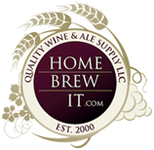What makes White Labs Liquid Wine Yeast Different?
Liquid yeast has many advantages over dried yeast. The variety of liquid strains is much greater, but what's most important is the flavor profile. Most home wine makers would agree that wine made with liquid yeast is superior in flavor. Liquid yeast is also supplied in smaller quantities. To make home wine making even easier, White Labs produces vials of liquid yeast culture that is ready to inoculate the juice.
What do home wine makers and retailers say about White Labs liquid yeast?
White Labs liquid wine yeast is similar to their beer yeasts. They enhance the flavor profile and the wine fermentation starts quicker than with dry yeast, which leaves less chance for bacterial contamination. After the customer selects the ingredients for their wine, we ask "Would you like live yeast?" and then select the proper yeast for their ingredients and wine varietals - Gary Wilder, Brew Your Own Brew, Tucson, AZ
We did an experiment. We chose one red and one white making two batches of each. One batch was made with dry yeast supplied with the kit and the other batch was made with White Labs liquid yeast. The wines made with the liquid yeast were much smoother, aged quicker and were overall easier drinking. - Robert Christian, The Beer Essentials, Tacoma, WA
White Labs Liquid Wine Yeast Strains Available from Quality Wine and Ale Supply:
WLP715 Champagne Yeast
Classic yeast used to produce champagne, cider and dry wines. This is a clean, neutral yeast.
WLP718 Avize Yeast
This yeast contributes to the complexity of white varietals, especially in barrel fermented Chardonnay.
WLP720 Sweet Mead/Wine Yeast
This yeast leaves residual sweetness in the wine. Good for blush styles like White Zinfandel, as well as sweet ciders, Gewurztraminer and Riesling.
WLP727 Steinberg-Geisenheim Yeast
This yeast is German in origin, and produces substantial fruit and ester characteristics. Perfect for Gewürztraminer and Riesling.
WLP730 Chardonnay
Dry wine yeast. Slight ester production, low sulfur dioxide production. Enhances varietal character. WLP730 is a good choice for all white and blush wines, including Chablis, Chenin Blanc, Semillon, and Sauvignon Blanc. Fermentation speed is moderate.
WLP735 French White Yeast
This classic yeast produces a creamy, rich texture in white varietals.
WLP740 Merlot Red Yeast
This yeast produces very active fermentations resulting in dryness. It is neutral in flavor and perfect for Merlots, as well as Shiraz, Pinot Noir and Cabernets.
WLP749 Assmanshausen Yeast
This yeast is German in origin and produces a spicy, fruity aroma. Enhances the velvety texture in Pinot Noir and Zinfandel.
WLP750 French Red Yeast
This classic Bordeaux yeast that results in a rich, smooth flavor profile.
WLP760 Cabernet Red Yeast
This moderate fermenting yeast results in a full-bodied flavor profile. Ester production will complement flavor especially in Merlot, Chianti, Chardonnay and Chenin Blanc.
WLP770 Suremain Burgundy Wine Yeast
Emphasizes fruit aromas in barrel fermentations. High nutrient requirement to avoid volatile acidity production. Alcohol Tolerance: 16% Attenuation: >80% Flocculation: Low. Optimum fermentation temperature: 60-90 degrees F.
WLP775 English Cider Yeast
Classic cider yeast. Ferments dry, but retains flavor from apples. Sulfur is produced during fermentation, but will disappear in first two weeks of aging. Can also be used for wine and high gravity beers. Attenuation: >80% Flocculation: Medium. Optimum fermentation temperature: 68-75 degrees F.
